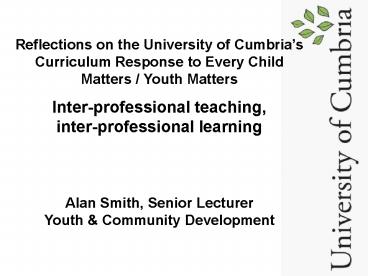Lorraine Hough - PowerPoint PPT Presentation
1 / 7
Title:
Lorraine Hough
Description:
For further information. Please contact: Alan Smith, Senior Lecturer. University of Cumbria. School of Applied Social Sciences. Bowerham Road. Lancaster. LA1 3JD ... – PowerPoint PPT presentation
Number of Views:49
Avg rating:3.0/5.0
Title: Lorraine Hough
1
Reflections on the University of Cumbrias
Curriculum Response to Every Child Matters /
Youth Matters Inter-professional
teaching,inter-professional learning Alan
Smith, Senior LecturerYouth Community
Development
2
- What did ECM / YM mean for us-
- Health / Social Work Behavioural
SciencesEducation / Teacher TrainingApplied,
Humanities Social Sciences - (All 3 faculties have programmes that fit)
- What did we think we should be doing-
- Multi-professional learningCreating the space
for debateInstitutional / cultural change
Every Student Matters
3
Achievements and Actions (1)
- Designed and delivered a Level One module for3
separate audiences- current students (600
registered so far)- current employees (349
registered so far)- childrens workforce (335
registered so far) - Course Portfolio Development and subsequent
institutional challenges CAT-rating, modular
structures etc - Invitation to deliver to 3 local authorities and
2voluntary sector providers - Engagement with regional workforce reform /
development groups
4
ECM100 - The Childrens Workforce
- Aim of the module
- To support individuals and agencies to implement
the ECM/YM agenda in their workplace. - Intended Learning Outcomes
- By the end of the module participants will
- 1. Understand the history/overview of ECM/YM
agenda - 2. Be able to apply this knowledge to their work
setting or community context - 3. Understand different roles and
responsibilities associated with ECM/YM practice - 4. Be able to consider their (organisations)
effectiveness in relation to the five ECM/YM
outcomes - 5. Be able to identify how they might contribute
to their organisations implementation of the
ECM/YM agenda
5
ECM100 - The Childrens Workforce
- Indicative Module Content
- Historical context of ECM/YM agenda
- ECM/YM aims and intentions
- Inter-agency/ inter disciplinary roles in ECM/YM
- Working as part of an inter-disciplinary team
- Organisations and their potential to respond to
meet the expectations of the ECM/YM agenda - Action planning to manage change in an
organisation - Course delivery model
- Session One - The history of ECM / YM
- Overview of key themes
- Session Two - The Common Assessment Framework
(CAF) and Integrated Working (IW) - Session Three - Making a difference ECM / YM in
the workplace
6
- Building on strengths / positives
- Undergraduate and Post-Qualifying opportunities
- Foundation-level courses
- Future Proofing Excellence in Childrens
Services notECM / YM - Cross-faculty development, writing, recruitment
and delivery - Obstacles
- Institutional systems which require ownership
of QA, Recruitmentand producing materials etc - Module credit-rating (15 / 20 etc)
- Non-transferable credit (Professional courses
lack flexibility) - Level of study / level of participants
- Future challenges / opportunities
- Dont use ECM / YM to drive institutional change,
even when ithighlights the need - Continually changing policy and practice context
(keeping updated) - Recently qualified students and CPD opportunities
- Opportunity to critically engage with the agenda
- credibility
7
For further information
- Please contact
- Alan Smith, Senior Lecturer
- University of Cumbria
- School of Applied Social Sciences
- Bowerham Road
- Lancaster
- LA1 3JD
- email alan.smith_at_cumbria.ac.uk































